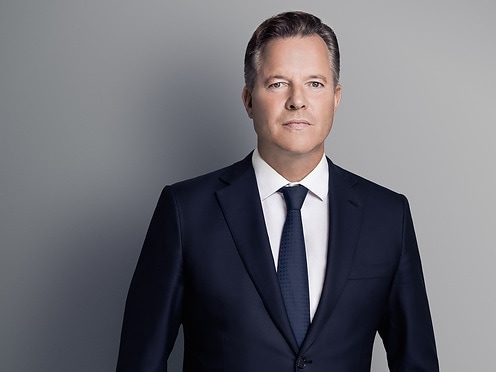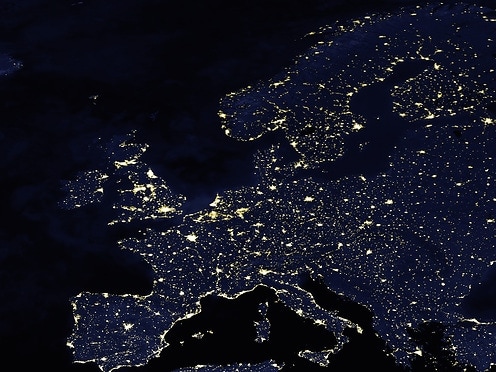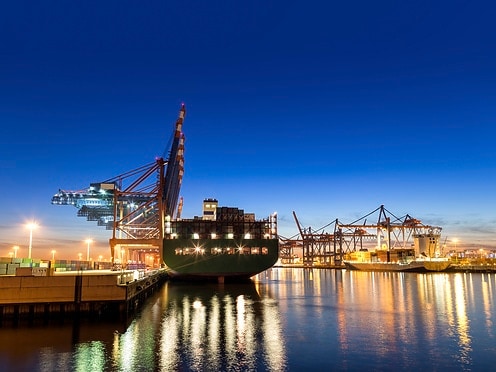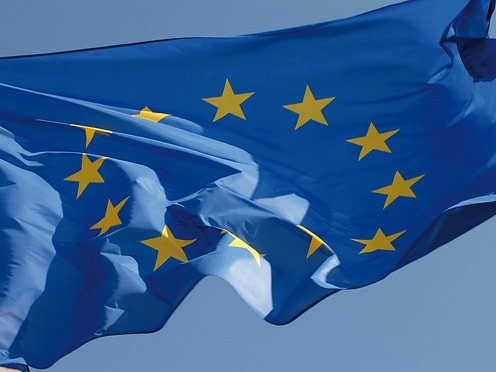A country in need of a plan
A diplomatic gaffe by the German Foreign Minister has shaken German-Chinese relations. It should remind us of where Germany stands – and encourage us to finally do our geostrategic homework.
Oliver Hermes is President & Global CEO of the Wilo Group, Chairman of the Board of Trustees of the Wilo-Foundation & Shareholder, member of the Board of Trustees of the Foundation for Family Businesses, member of the Executive Committee of the Near and Middle East Association (NUMOV), member of the Management Board of the German-African Business Association (Afrika-Verein) as well as Deputy Chairman of the Sub-Saharan Africa Initiative of German Business (SAFRI). Hermes studied economics, specialising in East Asia and China, and speaks German, English, French and Chinese. He is an essayist with articles published in independent media. The opinions expressed by the author are his own.

Johann Wadephul has made a blunder worthy of his predecessor Annalena Baerbock. “China is supporting Russian aggression against Ukraine – also to justify its own hegemonic endeavours”, German Foreign Minister Johann Wadephul recently orated into a microphone. In his speech to mark the 40th anniversary of the Japanese-German Centre Berlin, the CDU politician – who has set out to replace the moralising tone of his Green-party predecessor with interest-driven objectivity – issued a precautionary warning to Germany’s most important trading partner. Evidence for the analysis of the highest German diplomat? None to speak of.
Germany raises its index finger to admonish another country to please remember its values. So far, so clumsy – and normal? Not at all. There is something different about this latest German diplomatic faux pas. You have to savour it slowly: 80 years after the end of the war, the German Foreign Minister accuses China of fantasising about omnipotence in front of a Japanese audience. Between 15 and 20 million people in China fell victim to the Sino-Japanese War between 1937 and 1945 as part of the Second World War. After the Soviet Union, China suffered the most deaths in the Second World War.
No wonder, then, that China cannot easily forgive Germany for its fit of moral superiority this time. Wadephul recently had to cancel a planned trip to China because too few dates had been officially confirmed. Meaning: nobody wants to talk to the German Foreign Minister in China at the moment. Firstly, this is embarrassing. And secondly, it is dangerous because – as Mr Wadephul seems to have insufficiently considered – we are highly dependent on trade with China.
The case of Nexperia shows how dependent we are: The Dutch chip manufacturer, which was once a spin-off of the Philips technology group, is now majority-owned by China. According to the official explanation, the Dutch government took control of the company in September 2025 for security reasons.
In other words: Fearing its supposed rival China and under pressure from the United States, the Netherlands expropriated Nexperia’s shareholders and thus directly expropriated the People’s Republic of China, applying a law that had previously been considered the last resort of Dutch economic policy. Imagine this scenario the other way round! The consequences of this scandalous and unprecedented decision are well known. China reacted quickly and imposed a strict export ban on Nexperia products, on which numerous large companies in Europe depend, including Volkswagen.

Germany needs China and China’s Raw Materials
However, a look at the sober facts also shows how dependent we are on the partnership with China. China mines around 70 per cent of the world’s rare earths and processes around 90 per cent. The country has a virtual monopoly on metals and many other raw materials. The reasons for this include, but are not limited to, the high deposits of rare earths in China. Rare earths can also be found in Saxony, but they are almost impossible to mine economically.
Even today, nothing works without the coveted raw materials. Rare earths are needed for almost every component on which our high-tech world depends. From electric motor to data centre: the mobility revolution, the energy revolution and the accelerating AI revolution are inconceivable without raw materials from China. However, the success of these huge transformation processes is a necessary condition for countries like Germany if they do not want to be completely left behind by developments in the Global South. Take the Middle East, for example: countries like Saudi Arabia, Qatar and the United Arab Emirates are investing heavily in future technologies such as AI in order to become global technology leaders.
"The West can therefore neither manage without rare earths nor without China as a supplier."
The West can therefore neither manage without rare earths nor without China as a supplier. But even if it could: this would hardly reduce dependence on China. We must not be fooled by the protectionist tendencies of the past three years. We are still experiencing the effects of a geo-economic turnaround, which is a direct consequence of the geopolitical turnaround. Old alliances are crumbling, multinational cooperations are realigning themselves. Trade barriers, extra-territorial sanctions and technology embargoes follow on the heels of the politically motivated decoupling of supply chains, with the ambitious goal of restructuring them. But this political project is doomed to failure. It is impossible to reverse globalisation. It is too late to decouple supply chains because the world is already too interconnected and intertwined.
This rather simple economic insight can also be backed up by facts. The World Trade Organisation forecasts that global trade will grow by 2.4 per cent this year and reach a new record level. The global economic community is largely unimpressed by the protectionist ideas of politicians.

October 2025: Oliver Hermes met with the Chinese Consul General Yong Yu at the Wilopark.
Whichever way you look at it, we need Chinese raw materials. But it is not only this dependency that should give the German Foreign Minister food for thought. Germany’s reputation is also at stake: after decades of economic interdependence, China can rightly expect a partnership of equals. Instead, the People’s Republic – a world power, many times the size of Germany in every respect – is being reprimanded on a Berlin stage.
Would we treat the United States in the same way? I think not. Based on transatlantic tradition, we still trust the US largely unreservedly, including in the dealings with China. The United States is an important partner for us. But Germany only sees what Germany wants to see: in the vague hope that at some point the German-American relationship will be restored to its pre-Trump state, we hardly question the risks associated with America’s course towards China. If the US loses the trade war with its Asian rival, we will also lose – raw materials, money, security and a reliable partner since the beginning of China’s opening-up policy 30 years ago.
The recent meeting between US President Donald Trump and Chinese President Xi Jinping does nothing to change this. The US is celebrating the agreements reached in South Korea as diplomatic victories. However, China remains conspicuously cautious when it comes to categorising the results. This should give us pause for thought, as should the fact that European interests play no role in it. Not to mention the question of whether the latest deal will actually be realised. So, even after the latest meeting in South Korea, Germany remains blind in one eye.

Germany has not done its Geostrategic Homework
Germany does not know its geopolitical position. What no company can seriously afford, Germany has allowed itself for years: a lack of strategy. Germany must finally clear the jungle of opportunities and risks – Germany needs a geopolitical strategy! Once this mental work is done, the pieces of a functional strategy will fall together almost on their own. As has become clear here, this hard thinking is particularly urgent with regard to the supply of raw materials.
"What is needed is a functional procurement strategy that takes into account the geopolitical distribution of power."
Let’s make it concrete. What is needed is a functional procurement strategy that takes into account the geopolitical distribution of power, also in order to secure Germany’s supply of important raw materials for critical infrastructures and future technologies. This is based on the knowledge that there is not and cannot be complete end-to-end independence of economies with complex systems.
The questions are obvious. Which raw materials are already strategically relevant today and which will be particularly relevant in the future? How high are the availability risks? What sources of raw materials do we have ourselves and where are we dependent on imports (make or buy)? What supplier risks do the defined import countries harbour? At the end of this strategy process, one not only invariably arrives at a diversified (raw material) procurement strategy, but also deduces guidelines for realistic and interest-led foreign trade policy, which will contribute to securing Germany’s territorial and economic sovereignty and prosperity.
In their implementation, the findings should be reflected in strategically derived trade agreements and alliances. The organisation of these partnerships is of central importance: Programmes such as the “Global Gateway” initiative, which aims to link European Union countries more closely with emerging and developing countries, cannot work because they come too late compared to the connectivity strategies of the US and China and are also underfunded, too bureaucratic and not formulated on an equal footing with the partner countries. Anyone who categorises potential partners into “good” and “bad” is making a mistake. Nobody has ever built bridges with a “raised index finger”.
Which brings us back to Johann Wadephul. The strategy process outlined here – from an overarching geopolitical and economic strategy to a functional procurement strategy organised in new partnerships – clearly presupposes one thing: we must finally recognise where we stand. After Johann Wadephul’s faux pas, we got a cold shower of realpolitik. The accompanying diplomatic displeasure should have made the opportunities, risks and dependencies clear to everyone – and reminded us that China has always been a reliable partner for Germany. We should do everything we can to keep it that way.
























